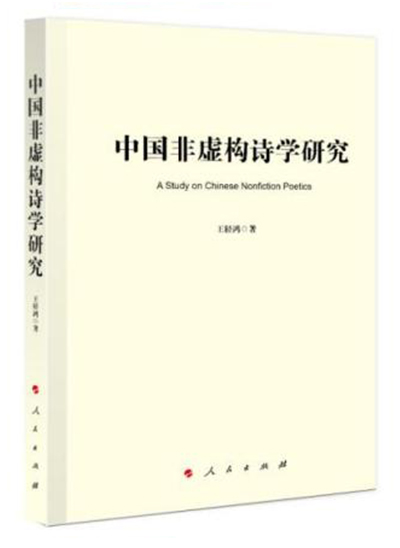Building Chinese non-fiction poetics

A Study on Chinese Non-fiction Poetics
From the pre-Qin era (prior to 221 BCE) to the late Qing Dynasty (1644–1911) and the early Republic of China (1912–49), Chinese literature was characterized by its non-fiction qualities, a tradition that held significant importance before Western concepts of “literature as fiction” spread to China. This tradition embodies a distinct poetic character rooted in ethnic uniqueness. However, literary theories emphasizing fiction have marginalized many non-fiction works. This exclusion not only fails to capture the profundity of Chinese literature but also leads to the dilemma of discourse failure in contemporary times.
A Study on Chinese Non-fiction Poetics, by Wang Qinghong, a professor of literature at Hangzhou Dianzi University, is a representative work in the field. This book represents the first comprehensive academic monograph by a Chinese scholar specifically addressing “non-fiction poetics.”
For a long time, there has been no consensus on defining the boundaries of “non-fiction poetics” or on outlining an overarching framework for related research. Key questions include how to trace the origins, development, function, and significance of Chinese non-fiction poetics systematically to clarify the contours of these issues. Additionally, how to conduct comparative studies of non-fiction literature in cross-cultural dialogues to maintain Chinese national characteristics and cultural identity in global cultural exchanges are critical questions. In A Study on Chinese Non-fiction Poetics, the author offers his own insightful opinions on such questions.
Most contemporary Chinese studies on non-fiction poetics apply Western literary theories, often resulting in incompatible phenomena. Therefore, there are few substantial and rigorously argued scholarly works within the field. Works like A Study on Chinese Non-fiction Poetics, which is meticulously researched, structurally sophisticated, and painstaking in conceptual clarification, are rare.
In Wang’s view, the aim of introducing non-fiction is to find a path for literature that is struggling within traditional literary frameworks. Non-fiction does not necessarily mean the absence of fiction. In fact, non-fiction discourse emerged in the information era, differing fundamentally from the cultural context of the print era in which fiction thrived. The holistic and comprehensive mindset in the information age breaks the binary opposition of fiction and forms the logical starting point of non-fiction.
“Contemporary” times represent an era characterized by information science and new media technology, which fundamentally differs from the industrial and print eras. In the print era, literary concepts were built upon binary opposition, with fiction playing a central role in defining literary characteristics. In contrast, the philosophical thinking of the information age emphasizes the concept of non-fiction, which focuses more on reality, extending the human experience. This perspective aligns with the philosophical thinking of traditional Chinese non-fiction poetics, highlighting a continuity between contemporary non-fiction and traditional Chinese thought.
Zheng Wei is an associate research fellow from the Institute of Literature at Heilongjiang Provincial Academy of Social Sciences.
Edited by YANG LANLAN
